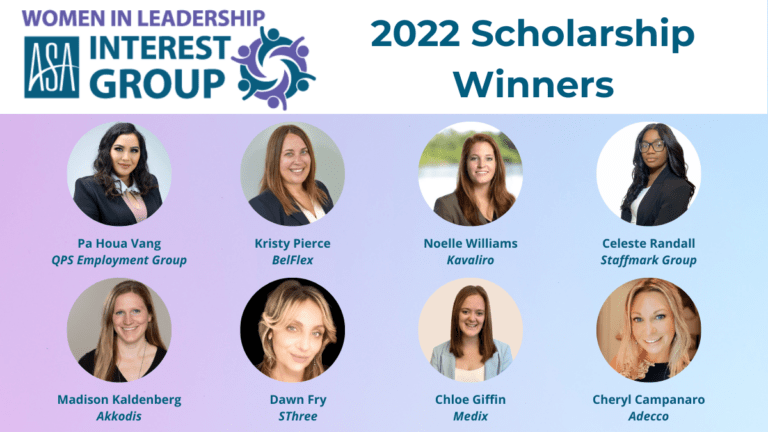Amber Hyman: An SIA Global Power 150 Woman in Staffing Powerhouse
As a follow up to Women’s History Month, we’re featuring a Q&A with our own Amber Hyman, who was recently named to the Staffing Industry Analyst (SIA) 8th annual Global Power 150 list. The list recognizes the most influential women in the staffing industry who have made remarkable contributions to their communities and the workforce solutions ecosystem.
Amber joined BelFlex in 2020 and has blazed a trail of inclusion and ingenuity ever since. Recently promoted to VP of People and Culture, we’re eager to see the barriers she breaks down next.
Q: What does the honor of being named to SIA’s Global Power list mean to you?
I’ve noticed in this industry that women aren’t often recognized. It makes being on this list with so many incredible women that much more meaningful. It shows we’re making an important statement in the staffing industry, having an impact, and adding value in a way that matters. And it doesn’t stop with the women on this list. There’s so much more to come—this is merely the tip of the iceberg.
It’s also a great honor to receive this recognition given I’ve only been in the staffing industry for three years. To be at this point in my career and have so many people value my input and support my ideas, it truly means the world to me.
Q: No one would guess staffing isn’t your first career path! Where did you work before BelFlex?
I began in long-term care working for a CPA firm that handled accounting for 17 firm-owned nursing homes. I lead a team responsible for HR, payroll, and accounts payable for a little over 14 years.
How did I get from long-term care to staffing? One word: Covid. When the pandemic hit, it was difficult in healthcare. My job required me to visit our nursing homes, in addition to our private clients. Each time, I had to get tested, adding up to three, four, five tests a week. Coupled with government tracking requirements, it was a lot. I needed a change.
I connected with BelFlex, and during the interview discovered many similarities between long-term care and staffing—both are fast-paced, people-centric, detailed, and impactful to people’s lives. Once I realized staffing would be a great fit, I made the leap.
Q: You’ve had such a positive impact at BelFlex. What has your career trajectory been like?
When I was first hired, it was as Payroll Manager. I oversaw a team of four and helped organize the payroll processing for the company. When the VP of HR left in 2022, I was promoted into a Director of HR role.
I held that position until recently, when I was promoted into my current role as VP of People and Culture. I’m so appreciative that company leaders continue to be open to my big ideas and outside-the-box concepts, and I’m excited to build this newly created role from the ground up, with careful thought and intention behind the development of new programs, processes, and initiatives.
Q: You’re our first woman of color to hold a VP role, and you were the first woman of color to serve as our HR Director. How meaningful has this been?
It honestly gets me emotional. In most companies, even within the staffing industry, people holding director-level roles and above are still typically white males. Yes, there are women, but they, too, tend to be mostly white.
For me to first hold a director role, and now a VP role, it means I get to showcase my culture and demonstrate loudly and proudly that people of color, especially women of color, have a rightful seat at the table. Our ideas, our stories, our lessons—they’re as important as those of the next woman or man.
When I visit offices and meet admins who are young Black women, they can look at me and see themselves in the same VP role one day—it is possible and it is important. This speaks volumes to the difference BelFlex is making, placing people in roles based on their merits, talents, and abilities. Every trailblazer and change-maker needs an avid supporter like that in their corner.
Q: You clearly have a passion for improving the lives and careers of women and minorities. When did this start?
Definitely in my teenage years. I was lucky to have a mentor growing up who focused on empowering my siblings and me to change our circumstances as adults. My mom was a single mother, and she is white. That meant not only did I not have a male figure in my household, I also didn’t have the opportunity to learn about my Black culture and where I fit in.
My mentor, Rodney Arnold, guided me into an entirely new world of Black history and what it truly means. I’ve carried that with me and, as I’ve matured, have made it a point to keep that legacy going. I strive to show that racial background and prior circumstances don’t have to define who you are. It’s about the choices you make, the information you gather, and the knowledge you accumulate that empowers you to reach your goals.
That’s why it’s so heartening to see that women are coming up right now, standing strong and making noise—forcing leaders to listen, see them, and recognize them, whether they want to or not.
Q: At BelFlex, you’ve already spearheaded a number of initiatives. Could you tell us about GROW?
GROW stands for Grow, Rise, Overcome, and Win. It’s an initiative that, to-date, has helped more than 20 women within BelFlex rise up and advance in the company.
It started with the book Together We Rise. One of the co-authors, Kendra Cato, attended a quarterly leadership meeting to speak about her journey as a woman in staffing. Everyone was so engaged that we realized we needed a way for women in our company to share and build self-confidence on an ongoing basis.
What began as a book club quickly evolved into a quarterly workshop focused on internal and external well-being to help to address physical, mental, and emotional wellness. It serves to empower BelFlex women in all facets of their lives, from overcoming stereotypes and obstacles, to figuring out how to live in this world as a mom, as a businesswoman, as a friend, as a wife, as a sister. And, though it began with lady leaders from our leadership team, we’ve expanded GROW to all women across the company.
Call-Out:
“What I have learned and placed into action from the GROW Workshop, and from us reading How Women Rise, by has felt like a weight being lifted off my chest. I’m still working on ‘reluctance to claim your achievements,’ but can now easily encourage my team leaders to claim their achievements, and shine while doing so. And in talking about ‘expecting others to spontaneously notice and reward your contributions’ I am more aware of how I handle my team’s wins, no matter how small. I’ve learned we can’t expect others to reward us for our contributions, but we can reward ourselves.” -Traci Johnson, Regional Director, Central Kentucky-Indiana
Q: You’ve also spearheaded an early wage access program. Can you share a little about that?
This is another initiative focused on helping people professionally and personally. Oftentimes employees we place in the field (or workplace) face roadblocks while doing their job. They may not have money for gas, or can’t afford required workwear, and they have to wait a week to get paid, which causes financial stress.
We discovered early wage access companies are a great solution. We partnered with Rain and Netspend at BelFlex. Now, the day after an employee works, up to 40% of those earned wages are available for withdrawal. It’s deducted from their total paycheck, and on payday they get the remaining balance. It’s one way we set BelFlex employees up for greater success in their new roles.
Call-Out:
“Candidates are excited to have access to their money when they need it. It is great to be able to provide real-world solutions to our candidates, and we’re excited to use it both as a selling point for current and future clients, as well as a great recruiting tool.” -Perla Navejas, Branch Manager
Q: Your contributions to the community outside of work are equally inspiring. Can you highlight a few? Like serving as volunteer coordinator for the Ohio Challenge Committee?
Annually we have a hot air balloon festival in Middletown, Ohio. It’s been happening for close to 20 years. When my children were younger, we would volunteer as a family. The festival noticed I was very organized and always willing to help once my children were adults. So, when an opening came up for their Volunteer Coordinator position, they offered it to me. I gladly accepted, and over the last eight years I’ve organized families and community youth in providing volunteer support for the festival.
Starting in 2017, until 2022 , I was President of the Middletown high school athletics Booster Committee. I was able to arrange for high school sports teams to volunteer during the Ohio Challenge hot air balloon festival. It showcased the students giving back to the city, and helped them feel pride in helping the community. The teams were also able to use the Challenge as a fundraiser, earning donations to fund tournaments, uniforms, and more. Now, though I’m no longer the president of the Boosters, I still work closely with the high school to continue to give athletes opportunities to volunteer. Fewer people want to volunteer these days, so if we can inspire a young group of people as they are becoming adults, hopefully that volunteer spirit will stick with them.
Q: Your volunteering doesn’t stop there. You also serve as administrator for the Cardinal Premier soccer league. What drew you to them?
We are 100% a soccer household. My husband is a soccer coach, and all three of our kids have played, or are currently playing, soccer. So, it’s a perfect fit.
The Cardinal Premier Soccer League is for kids and young adults, and allows competitive teams from multiple states to play one another. I facilitate scheduling and collection of fees, and also oversee the required IDs program that verifies date of birth and address for every player. I oversee a team of three people to review pictures and birth certificates, and work with clubs to ensure they have the required information.
Helping youth has remained a priority for me. I started my volunteer career by running a youth program for our church, and then ran a youth STEM summer program. Like my childhood mentor, I want to continue the legacy of inspiring kids to make the world better.
Q: One last volunteering question—could you talk about your work partnering with local schools to teach students to manage finances?
As part of an American Payroll Association (APA) challenge, BelFlex partners with my hometown high school, and other schools, to teach students how to read and understand a paycheck. We meet with students during class time and provide workbooks and games to walk through paychecks and taxes, and help visualize how it all works—so they understand that making $100 a week might really mean $75 after taxes.
We also hold mock interviews to teach students about the hiring process, and how to complete resumes, so we can positively impact and inform the next generation of workers.
Q: What advice would you give to women and minorities following in your footsteps?
The biggest piece of advice I can give—to women, minorities, and really anyone—is embrace the NO. People are going to tell you no all the time. They won’t like something you say, or an idea you share. Embrace it and learn from it. Take the chance to tweak, re-evaluate, and re-spin, and then put yourself and your idea back out in the world! Don’t ever stop at the no because it could very well be the next person’s yes. You can make it happen.
Q: In your eyes, what remains the biggest DE&I roadblock for companies?
Too many people still get caught up on the color of people’s skin. It’s a huge roadblock. Stereotypes abound, and DE&I becomes an act of checking a box to say it’s done. You can’t take the approach of saying you’ve hired ten people of Mexican descent, five people of African American descent, and three people of Asian descent, and that’s enough. Check. DE&I is not a checklist.
It’s a meaningful life change for a company and all the individuals within it. It’s making sure that when people say “we’re trying to be more intentional” that it doesn’t stop at the color of someone’s skin. Or that it doesn’t stop at all. It’s not a KPI. It’s not finite. If you treat it that way, you’re forgetting the whole point of being inclusive in the first place. It’s about people feeling like they belong, are free to share their experience and have their voice heard, and can be who they really are.







